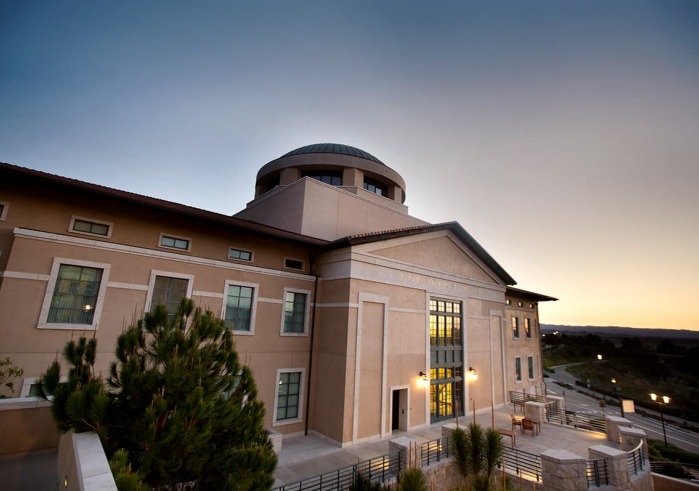Soka’s Center for Race, Ethnicity, and Human Rights Begins Fulfilling Its Mission

Announced last summer, Soka University’s Center for Race, Ethnicity, and Human Rights has begun fulfilling its mission to “provide space and resources for students and faculty of Soka University of America to engage in inquiry, research, and constructive dialogue related to race, ethnicity, human rights, and their intersections.”
In January, the REHR Center co-sponsored its first event, commemorating Martin Luther King Jr., and on February 2 launched its webpages and confirmed literary critic and Black feminist scholar Dr. Hortense J. Spillers as its Distinguished Visiting Faculty Fellow. Dr. Spillers, Gertrude Conaway Vanderbilt Professor of English at Vanderbilt University, collaborated with center staff, which includes co-directors Kevin Moncrief, vice president for Mission Integration, and Associate Professor of Latin American Studies Ian Read, as well as its newly appointed student and faculty fellows and executive host, Vice President for Academic Affairs Michael Weiner, to develop the center’s mission statement.
The REHR Center’s immediate priorities include assisting the university with the recently announced search for a presidential hire of a professor of Black Studies, a senior-level position that will help the effort to create a new program in Race and Ethnic Studies, assisting the Faculty Forum in developing academic programming focused on race and ethnicity, and developing programming for the community-at-large.
SUA President Ed Feasel originally announced the formation of the REHR Center in July 2020, along with a number of other initiatives, including the development of the Office of Diversity, Equity, and Inclusion and the 20th anniversary project. Prof. Read explained that President Feasel “created the parameters of possibility and within them we see the vision. But that requires the fellows, the students, and the faculty. What we are trying to do is not top-down.”
To that end, the center will have up to three faculty and three student fellows each year. The inaugural faculty fellows, who were chosen for their expertise and experience, are Nidanie Henderson-Stull, assistant professor of biochemistry, and Lisa MacLeod, associate professor of International Studies. The inaugural student fellows are student body president Shunji Fueki ’21, who is able to serve as an elected representative of the students, and Vibhu Walia ’22. One student fellowship, offered to the Black Student Union, whose organizing efforts were instrumental in highlighting the need for the center, currently remains open.
“I don’t think any organization, center, effort, or program will reach its potential and confront the problems of racism or strive towards a more equitable world in which human rights are respected without the voice of Black Americans,” Prof. Read said, “and as a center in the US, we need the voices of diverse Black Americans.
“But I also have to emphasize that Soka is a global university with a global mission and we have been called on by our founder to see fellowship in global humanity, which is also what the center is trying to do.”
For example, Fueki, a student fellow, is working with Prof. MacLeod to organize a topic on statelessness—the condition of not having an officially recognized nationality—as a human rights issue. The emphasis on both local and global human rights also aligns with the university’s effort to recommit to its founding principles.
“Race has been a problem in every single country, but people don’t know about it,” Moncrief said. “Part of being a global citizen is imaginative empathy, and we have the opportunity to inform those who wouldn’t have any idea.”
The center is developing programming with guidance from leading scholars in the field. “One thing I like to think about, when we think about companies out there, is that it’s very hard to name one older than 50 and those that do exist have changed over time, but it’s not hard to name at least 10 universities older than 200 years,” Prof. Read said. “To think that convention or a program can be created in one or two years makes us forget that SUA will be here in 200 years and that’s humbling. We are trying to build something that will outlive us and that takes patience, real deliberation, and care.”
Nevertheless, the center has moved relatively quickly, with support for two new courses taught this year by professors MacLeod and Henderson-Stull. Its top priority is the collaborative development of new courses related to issues of race, ethnicity, and human rights, and a new professor of Black Studies will be an important step in program building.
“When you talk about things as entrenched as racism or sexism,” Moncrief said, “the way to start to turn the tide the other way is to create institutions that live on and educate people regardless of their background.”
As the REHR Center works on its long-term mission and takes its first steps to create and sustain dialogue in the Soka community in the short term, it aims to develop rich programming to learn from diverse human rights leaders on what it takes to become global citizens committed to justice. The center’s inaugural event with Ambassador Young and Dr. Spillers “was the first of what will be thousands of dialogues,” Moncrief said.
Another discussion, “Halfway Home: Race, Punishment and the Afterlife of Mass Incarceration” with Dr. Reuben Jonathan Miller and Jhody Polka, was held on February 16. Next up, on March 3, is “Fearing and Desiring of Black Women, A Book Talk on ‘Imagining the Mulatta: Blackness in US and Brazilian Media,’” with Dr. Jasmine Mitchell.
